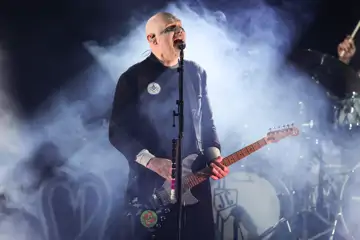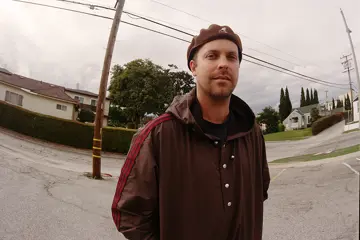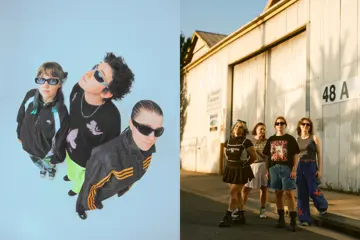ANIMALS
★★★1/2
Sophie Hyde’s follow-up to 52 Tuesdays takes her from Adelaide to Dublin, where Holliday Grainger and Alia Shawkat play a pair of hard-partying pals who, at the end of their drunken 20s, start to come apart. The former starts to a little more straight, the latter steers ever harder into debauchery and oblivion. At times it submits to dramatic clichés, but Animals is defiantly a film about messy, contradictory people, and the complexity of entangled friendships.
ANTHROPOCENE: THE HUMAN EPOCH
★★★★
The Canadian filmmakers behind Manufactured Landscapes and Watermark effectively mint a sister picture, with another visually-resplendent documentary gazing — with a mix of wide-eyed wonder and due horror — at the unfathomable vastness of human engineering. As we tour through smelters, mines, quarries, tunnels, landfills, and seawalls, we learn new words (terraforming, technofossils, anthroturbation) and sad facts, Anthropocene laying out the environmental catastrophes, mass extinctions, and increasing toxicity of the age of man.
BAIT
★★★1/2
Bait is a portrait of simmering class conflict in an English fishing village, sure. But it’s mostly a work of distinctive style, with a vintage, unnerving affect achieved from its hand-wound 16mm black-and-white film and unreal ADR voice dubbing. It creates a quality that seems both postmodernist and old-timey, an effective approach for a film addressing timeless British-societal themes in a time of Brexit.
THE BEST OF DORIEN B
★★★1/2
Don't miss a beat with our FREE daily newsletter
Things — marriages, families, bodies, domestic harmony — fall apart in this droll Belgian comedy. It’s a middle-aged angst movie, in which the titular character, a veterinarian/wife/mother, finds her routine life suddenly exploding; long-stifled or repressed desires making for sudden, radical shifts in behaviour. It’s filled with charm, especially in Kim Snauwaert’s lead turn, which is all the more memorable for being her screen debut.
BLINDED BY THE LIGHT
★★★
Crowdpleasery runs amok in Gurinder Chadha’s ‘Springsteen musical’, a coming-of-age comedy in which a Pakistani teen, in rural Britain at the height of Thatcherism (cue: very 1987 wardrobes, Bros jokes), falls in thrall to the music of The Boss. Springsteen songs play on the soundtrack, are sung by the characters, are quoted in dialogue, or appear as words floating on the screen. It ultimately plays something like Bend It Like Beckham, only with a love of football swapped out for an obsession with Thunder Road.
THE BRINK
★★★
The Brink is an observational documentary on Steve Bannon, which favours fly-on-the-wall detachment over outright condemnation, meaning your mileage may vary. Director Alison Klayman’s approach is, essentially, to hang out with her subject on the road, building familiarity and, ultimately, feeding him enough rope. Bannon’s noxious boasts and bro-downs with European neo-fascist politicians are their own indictment, but the backstage access is also humanising.
THE CHILLS: THE TRIUMPH & TRAGEDY OF MARTIN PHILLIPPS
★★
It’s yet another rockumentary, replete with the talking heads and the archival footage and the classic jams; here chronicling the career of The Chills, the seminal jangle-pop outfit from Dunedin. But, Julia Parnell’s picture isn’t entirely a reminiscence on the indie-rock past, with contemporaneous footage finding Phillipps, suffering from the effects of Hepatitis C, cleaning through his hoarder’s house, preparing memorabilia and collected shit for a career-retrospective museum exhibition. It makes the act of looking-back feel natural, and the mediocre movie seem meaningful.
COLD SWEAT
★★★1/2
Once you get past the laughably-bad piped-in-cheering-from-nonexistent-crowd depictions of the Iranian women’s futsal team playing a big match, Soheil Beiraghi’s film becomes something far better: an indictment of Iran’s institutionalised sexism, with the star soccer captain caught in a bureaucratic nightmare administered by a vindictive — but legally-empowered — husband.
DANIEL ISN’T REAL
★★★
It’s a great premise for a horror movie: an imaginary childhood friend returns in adulthood, and reveals himself to be less benevolent companion, more demonic possession. This is most effective when director Adam Egypt Mortimer plays it as comedy, or dark riff on Jungian psychology. But the initial potency stalls out in a final act in which, inevitably, our protagonist and antagonist — children-of-celebrity Miles Robbins and Patrick Schwarzenegger — must face off in a big final fight.
A DOG CALLED MONEY
★★★1/2
In making her last LP, The Hope Six Demolition Project, PJ Harvey first travelled with war reporter Seamus Murphy to war zones in Afghanistan, Kosovo, and Washington DC. Then, she returned to a purpose-built studio that doubled as art installation: patrons able to watch the album being recorded through a one-way mirror. Murphy serves as documentarian of both acts, essentially chronicling Harvey’s creative process. It’s strictly observationist, a portrait of an artist at work minus any trappings of biography.
ENDZEIT – EVER AFTER
★1/2
Two original-odd-couple women traverse the treacherous German countryside in the middle of a zombie outbreak. The squabble, strive for survival, and are haunted by entry-level emotion-ginning flashbacks. The most potent, virulent strain of contagion at play for viewers, though, will be a viral dose of zombie fatigue. The fact it was made by a cast and crew almost entirely consisting of women is a great sell, but the film itself — which comes replete with Trine Dyrholm with flowers growing out of her hair as manifestation of mother nature— isn’t much good; director Carolina Hellsgård failing to make this spin around an overplayed genre seem inspired or insightful.
HAIL SATAN?
★★★1/2
The friendly men and women of America’s Satanic Temple don’t sacrifice virgins or drink the blood of babies. Instead, they’re mischievous political pranksters out to use the scourge of Satanism as a political weapon, fighting back the growing power of the evangelical lobby, and using a mixture of performance-art, public protest, and All-American litigiousness to make sure the divide between church and state remains.
THE HEART DANCES
★★★1/2
A behind-the-scenes chronicle of a New Zealand production of a ballet inspired by Jane Campion’s cinematic classic The Piano, The Heart Dances becomes a discussion on representation, the cultural weight of storytelling, and the perils of the creative decision-making process on grand productions.
HERE COMES HELL
★★★
The hook for Here Comes Hell is that it’s like ‘Downton Abbey meets Evil Dead’. Which makes Jack McHenry’s flick essentially a one-joke movie, a mish-mash of styles in which posh comedy-of-manners meets gleeful B-movie splatter. But it’s hard to fault the director for delivering so perfectly on his promise, in nailing the collision of tonalities with wit and style. If you’re going to make a one-joke movie, it’s important to make sure the joke’s told well.
HER SMELL
★★★★
In the opening acts of Alex Ross Perry’s study in grunge-rock iconography and music-biz casualties — which take place in green-rooms, backstages, and studios — Elisabeth Moss breathes fire as some Courtney Love-esque trainwreck of a human, strung out and manic and filled with the belief of her own genius. It’s by far the most obnoxious thing Perry’s done, which is definitely saying something. But in its final acts the film turns unexpectedly and tender, becoming the most sincere, affectionate thing Perry’s done. It’s, ultimately, a wild ride, one not for the easily annoyed or overly precious.
HIGH LIFE
★★★★1/2
Claire Denis in space? With R-Patz, Juliette Binoche, Mia Goth, and André 3000? The very idea is delightful. And the results themselves are particularly bonkers. At first, you might feel like you’re in familiar deep-space-mission territory — meeting the motley crew, witnessing their routines — before we’re introduced to something called the "fuck box". From there, it’s a work dowsed in bodily fluids, filled with taboos, and, ultimately, one great near-future-sci-fi allegory for incest.
HONEYLAND
★★★
A portrait of an ageing apiarist keeping bees in the Macedonian mountains, Ljubomir Stefanov and Tamara Kotevska’s documentary is almost inevitably going to be about changing times. Remote communities, rural farmers, traditional beekeeping methods, and even bees themselves are all depicted as fragile entities, dying out in the face of an increasingly-monocultural world.
IN FABRIC
★★★★1/2
A film about a cursed, killer dress sounds like B-movie schlock, but, in the hands of Peter Strickland, it’s another work of glorious wardrobe, absurdist humour, lurid sensuality, and hyper-stylised visual splendour. Here, capitalism is depicted as a form of decadent occultism, with its Gothic department store feeling like the consumerist counter to, say, the ballet school in Suspiria.
JESUS
★★★1/2
Ever wanted to see a tiny, doll-sized Jesus riding on the back of a rubber duck? Then Hiroshi Okuyama’s debut film — made when he was just 22 — will provide you with such joy. Here, a nine-year-old kid finds himself torn from Tokyo, transplanted to the tiny mountain town of his parents, where the biggest culture-shock is suddenly attending an ultra-Christian school. Overcoming his alienation, he tentatively tries praying, and makes himself a new, ridiculous, son-of-God playmate, who often makes his wishes come true. The tone is at once comic and minimalist, its stark frames observing a child trying to make sense of the world.
JOURNEY TO A MOTHER’S ROOM
★★★1/2
After an opening act involving workplaces and nightclubs, Célia Rico Clavellino’s mother/daughter drama settles down into one apartment, and then never leaves; so often watching Lola Dueñas and Anna Castillo just silently sitting on the couch. In such, it attempts to convey intimacy, domesticity, banality. It’s a classic ‘small’ film, in which stakes are low and emotions are left to slowly accumulate.
JUDY & PUNCH
★★★1/2
Mirrah Foulkes directorial debut, a riff on the most famous names in domestic-violence-themed puppet-shows, is one of the most distinctive — and ridiculous — Australian films in years. In a 17th-century village that feels somewhere between grim fairy-tale and absurdist parable, the braying drunkards and hypocritical zealots have two forms of entertainment: puppet shows and public executions.
THE KLEPTOCRATS
★★★
It’s not a great piece of filmmaking, but The Kleptocrats is undoubtedly a great story. Sam Hobkinson and Havana Marking’s documentary is an investigative chronicle of large-scale international corruption, fraud, money laundering, and embezzlement, which is traced all the way back to the Malaysian prime minister. Amazingly, it all unravels due to an eye-catching production investment in The Wolf Of Wall Street!
LADYWORLD
★★★1/2
Amanda Kramer’s oddball micro-budget game of play is essentially a contemporary all-female spin on Lord Of The Flies: eight young ladies are trapped, by an earthquake, inside a house; a micro-society forms; then madness breaks out. It’s a study in the savagery of teenage girls, but it’s hardly earnest: the directorial tableaux look like fashion shoots, and the drama is essentially absurdist theatre. Ladyworld will certainly charm some viewers, but annoy more.
LEFTOVER WOMEN
★★★
“Marriage is a business between two families,” pronounces one concerned parent, in this documentary portrait of unwed Chinese women in their 30s, who’re treated to condescending advice, social stigmatisation, and even government intervention. With state-sponsored speed-dating events and weekly ‘marriage markets’ where parents swap profiles on their children, it’s a world removed from drunken Tinder-swiping. Leftover Women is, in such, both amusing and depressing, a chronicle of debilitating cultural stands and entrenched sexism.
MARIGHELLA
★★1/2
Seu Jorge plays the titular militant dissident in Wagner Moura’s directorial debut, an epic (158 minute!) chronicle of a mid-20th-century revolutionary, defying Brazil’s military dictatorship, that feels both culturally specific and cinematically familiar.
MINOR HISTORY
★★1/2
The title of Asad Raza’s documentary isn’t ironic or self-effacingly humble. It’s descriptive. Minor History is 90 minutes of conversations with the director’s 90-something uncle; an intellectual Indian émigré living out his final days in hoarder squalor in snowy Buffalo, New York. The discussions are personal history tinged with greater political history, but there’s also a real limit to their cinematic appeal.
MONOS
★★★★
A troop of child soldiers are tasked with looking after a Western captive high in the Colombian mountains, in this stark parable from Alejandro Landes. As a study in a micro-society of kids, with a deteriorating group psyche and a descent into primal madness, it’s no surprise that there’s explicit Lord Of The Flies reference. Beautifully photographed and blessed with a Mica Levi score, it’s one of SFF’s standout pictures.
MY NUDITY MEANS NOTHING
★★★1/2
At 30, Marina de Van wrote, directed, and starred in In My Skin, a profound body-horror flick inflicted on herself. Now, in her late-40s, she again turns the camera on herself, in a part-documentary, part-fantastical chronicle of domestic depression, online dating, and the social value of a woman’s body. Any cries that it’s a work of narcissism are undone by the unflattering mirror she holds up to herself; something evoked in My Nudity Means Nothing’s playful title.
NEVER LOOK AWAY
★★★1/2
Florian Henckel von Donnersmarck’s three-hour epic studies 20th-century German history through a singular figure: an artist struggling to find his way through rising National Socialism, wartime horrors, and on either side of a divided nation. His shadow antagonist is his father-in-law, a super-successful doctor and former Nazi medical officer, intimately connected to the horrors of Third Reich eugenics and to our painter’s seminal childhood tragedy. Von Donnersmarck is reaching for the same symbolic drama that powered his great surveillance-state romance The Lives Of Others, but in taking a grander swing, Never Look Away is not nearly so singular or distinct.
ON THE INSIDE OF A MILITARY DICTATORSHIP
★★★1/2
A sober study on the recent political history of Burma, chronicling years of military dictatorship, the unconvincing (failed?) transition to democratic rule, and the horrors of the Rohingya genocide. There’s a host of notable talking-heads interviewed herein, with Aung San Suu Kyi the most notable, famous, and definitive figure of the debate. Karen Stokkendal Poulsen’s documentary is telling a very specific story, but the themes are, ultimately, broader: this a film about intractable social systems, endemic corruption, and the politicised scapegoating of minority groups.
ONE CHILD NATION
★★★1/2
The horrors of China’s national procreation policy are brought starkly to light in this dark documentary, a chronicle of state-administered sterilisations, mass abandonment of babies, and the forcible theft of children by human traffickers.
ONLY YOU
★★★★
Laia Costa and Josh O’Connor meet-cute on New Year’s Eve — they each hail the same taxi — and quickly fall into a new romance. When a whimsical desire to have a baby turns into a dispiriting program of IVF appointments, their relationship is tested; initial passions giving way to growing resentments. There’s shades of the great films of Carlos Marques-Marcet (10.000km, Anchor & Hope, The Days To Come) in this profound, empathetic, human, and brilliantly-acted study of human relationships.
OUR TIME
★★★1/2
Carlos Reygadas is a libtard cuck. Well, at least in his latest film. Playing opposite his real-life wife, Natalia López, the Mexican auteur casts himself as a rural rancher whose open marriage allows his spouse to undertake an in-the-open, not-even-hidden-from-the-kids affair with a handsome American ranch-hand. It’s essentially a study in the collision between philosophical idealism and petty, human emotions; but one housed in the middle of an obtuse three-hour art-movie that is just as happy to watch children playing or sit down for a whole movement at an orchestral performance.
PHOTOGRAPH
★★★★
Against the endless thrum of Mumbai, a lonely street photographer and a shy accounting student cross lines of caste and class in this charmer from The Lunchbox director Ritesh Batra, who again fashions a humble romance shot through with notions of fate, chance, and human connection.
PIRANHAS
★★★
It’s all the regular organised-crime-movie clichés — taking bribes and taking names, gunning people down, doing piles of coke on mounds of cash, working your way up from the bottom to the top — only, this time, the proponents of such structured ultraviolence are a bunch of kids. It’s, of course, symbolic of how deep corruption is sown in Neopolitan society, and how the cycles of violence are socially entrenched.
PRESENT.PERFECT
★★★
Present.Perfect is a film stitched together from publicly-accessible live-streamers in China. Instead of looking the industry’s celebrity subjects or powerbrokers, director Zhu Shengze cribs footage from barely-seen streams and marginalised figures: factory and construction workers, people dealing with disabilities, the lonely and alienated; making a commentary on failed Chinese notions of collectivism and the therapeutic qualities of individualism.
SCHEME BIRDS
★★★
Scheme Birds is like a documentary riff on the familiar British cinematic modes of kitchen-sink realism and/or working-class miserablism: the lives are hard, the figures are rough as guts, and the accents are so thick as to be near-impenetrable. “If you stay here, you either get locked up or knocked up,” says the film’s teenaged subject, of a young girl’s lot on her Scottish housing-estate. Soon enough, she’s the latter, and co-directors Ellen Fiske and Ellinor Hallin observe the brutal cycles of economic disenfranchisement, and the suffocating cloak of hopelessness.
SCHOOL’S OUT
★★★★
Evil kids! Handsome Laurent Lafitte arrives as fill-in teacher at a prestigious academy in the French countryside, tasked with teaching a class of ‘advanced’ children after their last teacher leapt out the classroom window. At first unnerved by their arrogance, our in-over-his-head teacher soon suspects that these kids are plotting something big. With carefully-controlled composition and a command of tense mood, Sébastian Marnier has made a portrait of adult angst and fear of the younger generations; essentially a work stewing in the guilt of handing young people a toxic, dying planet.
SEA OF SHADOWS
★★★
Sea Of Shadows opens with a veritable action-movie sting, largely seen in night vision: a boat of illegal fisherman, bankrolled and armed by Mexican cartels, sailing headlong towards a Sea Shepherd vessel patrolling these waters. It’s a literalisation of the battle taking place in the Sea Of Cortez, where the Chinese-black-market value of a fish (“the cocaine of the sea”) is so exorbitant that, the effects of widespread illegal fishing for it have rent an ecological disaster, leading to the near-extinction of the world’s smallest whale, the elusive vaquita. Sea Of Shadows wears its essential message in its title: this is, indeed, an SOS.
SHOOTING THE MAFIA
★★★
Letizia Battaglia has spent an entire photojournalistic career taking pictures related to the Cosa Nostra: made men in portraits or in court; the crime-scenes and dead bodies left behind in their wake; the victims of their reign. Matching her work, and personal testimony, to old newsreels and TV reports, director Kim Longinotto effectively fashions a double history, with the personal mirrors the national; the film’s subject chronicling 20th-century Italy in all its corruption and horror.
SKIN
★★★
Jamie Bell dons the facial tattoos in this based-on-a-true tale story of a white supremacist slowly growing disillusioned with an ultraviolent life. There’s power in the subject matter, but the delivery also seems a little pat: this tale of redemption offering cinematic hope at a time of growing nationalism. In a way, it almost feels old-fashioned: trading in American History X black-leather-clad clichés at a time in which Nazis now wear polo shirts and boat shoes.
SYNONYMS
★★★1/2
Nadav Lapid’s acidic portrait of Israeli expats in Paris is both cine-memoir (of the director’s own time, post-military service, living in Paris) and greater study of cultural identity. As his on-screen proxy seeks to obliterate his ties to his heritage and language, he finds reminders — and grand symbols — of home creeping in around him; it not so easy to shake off personal and cultural militarisation.
THE THIRD WIFE
★★★★
There’s shades of Tran Anh Hung in this Vietnamese period-piece, which is so lovingly shot, so full of lingering silences, so evocative of both the tactile and the ineffable, that it begs old standby film-crit descriptors like ‘sumptuous’ and ‘sensuous’. Set in the 19th century, it follows a child bride who arrives, as the new titular spouse, in a family home that’s a whole world unto itself, full of sex and danger and incestuously-entwined family dynamics and shots where out-of-focus objects linger in the foreground of the frame.
UP THE MOUNTAIN
★★★
For those who love to use film festivals as a chance to witness cinema that stands in stark contrast to the entertainment-products that usually dominate screens, this Chinese documentary — about a painter in a rural mountain village — is a fine example. Unvarnished, unhurried, and uneventful, it’s a work of quiet contemplation, proceeding at a pace best described as ‘restful’
WALDEN
★★★★
A succession of slow-panning, 360-degree-rotating single takes, Walden stitches together its circling landscapes into one ribboning road-movie, a travelogue charting the logistics of a global logging operation. It’s a striking, distinctive work of meditative minimalism that plays, ultimately, as a long, slow horror-show.
THE WANDERING CHEF
★★★1/2
Those fond of silently watching a meal get made may find nirvana whilst watching The Wandering Chef, a sweet, slight documentary that radiates an almost zen-like calm. Its titular subject, Jiho Im, wanders the Korean mountains rooting out the greens, herbs, and shrubs not thought of as edible; so many of them "clean your blood", he enthuses. He prepares feasts in remote shacks with both love of tradition and fondness for experimentation, preparing and plating with a reverence that seems religious.
WHEN TOMATOES MET WAGNER
★★★1/2
It seems like a cute hook for a documentary: in a tiny Greek village, stubbornly-traditional farmers encourage crop growth not via pesticides or petrochemical fertilisers, but by playing their plants classical music. Yet, When Tomatoes Met Wagner soon burrows down deep into rich thematic terrain, as our elderly villagers get a first-hand lesson in competing in a globalised marketplace; the film about how the late-capitalist system is essentially at odds with humanity.
WHY DON’T YOU JUST DIE!
★★★1/2
Opening with a memorable, hilarious, ridiculous, John Wick-ain’t-got-nothing-on-this stoush, Why Don’t You Just Die! is a visually-flashy action film of kinetic energy, throttling motion, and copious blood sprays. Its set-up is simple: largely contained in one apartment, it’s a literal battle between an overbearing father and his daughter’s prospective new boyfriend. In such, it’s a satire of possessiveness and machismo whilst also being an unalloyed valentine to big-screen depictions of stylised violence.
WITKACY & MALINOWSKI
★★★1/2
Billed as “a cinematic séance in 23 scenes”, this mid-length, micro-budget Australian production takes its cue from the avant-garde theatre penned by one of its real-life protagonists. Its train journey through the Queensland countryside doubles — no, wait, triples — as journey into the collective World War I psyche and journey into cinematic delirium/madness. With its discussions on the theory of relativity and the cultural currency of storytelling, Witkacy & Malinowski is meta to the core.
XY CHELSEA
★★★
Following Chelsea Manning upon her release from prison, Tim Travers Hawkins’ film is best witnessed as a work blessed with intimate access. Rather than placing Manning’s story — the leaking of classified military documents, the torturous military imprisonment, the commuted sentence, becoming a figure both villainised and heroised — in broader geo-political context, XY Chelsea is a collection of stilled, backstage moments, often in the middle of a media storm.















